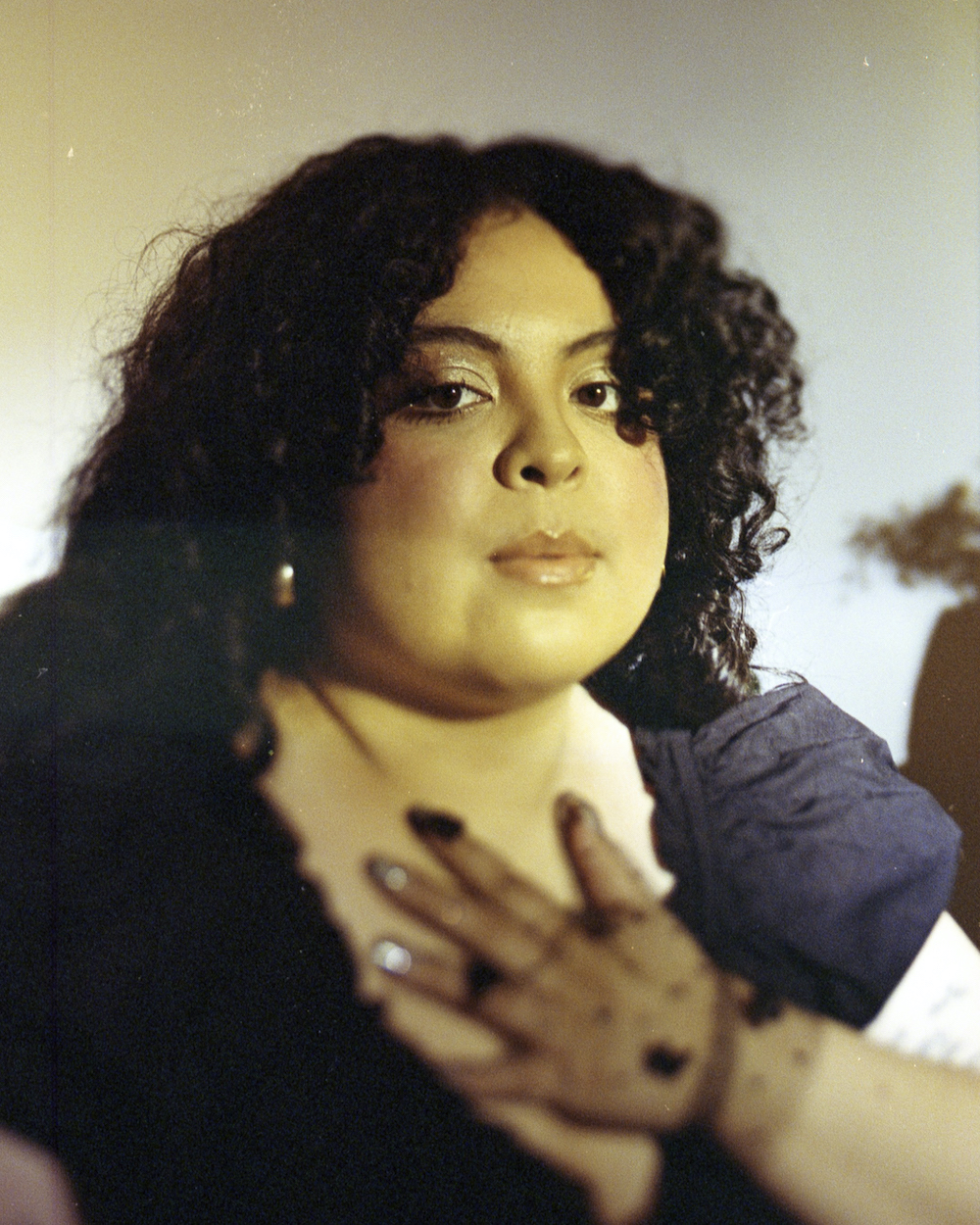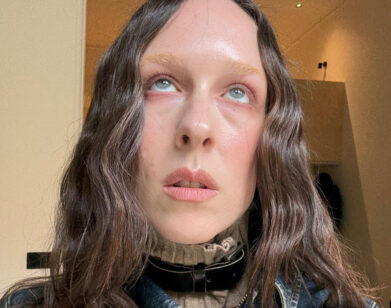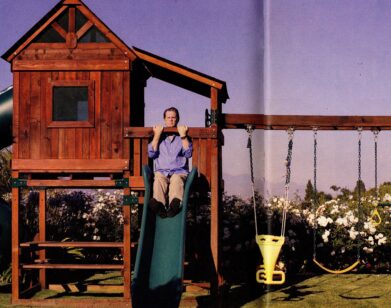Music!
KAINA and Helado Negro Are Making Music for Each Other

Photo courtesy of KAINA.
One of the best parts of blowing up is finding yourself suddenly in the same orbit as your idols. For KAINA, the Chicago-native whose velvety soul-meets-salsa sound reflects the varied sonic references of her blended Latinx and American upbringing, that idol is the pop-folk artist Helado Negro. Helado Negro, himself a first-generation Ecuadorian American, even appears on the 26-year-old artist’s latest album, It Was A Home, which also features the ’90s riot grrl stylings of Sleater-Kinney. Later this year, KAINA will join Helado Negro on his Far In world tour—but before they hit the road, they hopped phone to talk about their shared experiences as first-generation Americans making art, their private musical hangups, and the Cheetah Girls.
———
KAINA: Oh I’m so hyped about this.
HELADO NEGRO: Same, you know I love you. Your album isn’t out yet, is it?
KAINA: It’s out Friday.
HELADO NEGRO: So what’s up? How are you feeling?
KAINA: Good. I mean this is like my favorite thing, just being able to chat with you. But, feeling good, lots of work. You just finished putting out your album, so you know how that goes.
HELADO NEGRO: Do you like this work? Do you like the promo work?
KAINA: [Laughs]
HELADO NEGRO: Seriously! No, no. I know it’s hilarious. In the past, it would’ve been a relief to do press via Zoom, and to not have to travel to like 100 different locations to promote your work. Do you like it?
KAINA: Yes and no. I mean, I’m not someone who loves to talk about myself all the time, so I’m uncomfortable, even though this is my job. But I do like having conversations with writers. I love the idea of a piece like this, of us talking. Talking about myself all the time is not super fun, but I do love how it can affect culture sometimes, and the fact that a writer has worked their whole life to become a great writer, and then writes something about me.
HELADO NEGRO: It’s hard. I love the record. I asked because whenever I finish an album, I always find that I don’t know what to say about it. But you need to find some kind of structure of words to express your feelings about your own work, because otherwise you end up doing some sort of stream of consciousness. When you read it later on, you’re like, “Oh my god.”
KAINA: “What was I saying?!” Yeah.
HELADO NEGRO: More often than not, that happens to me.
KAINA: Oh, definitely. It took me like two years to understand what my last project, Next to The Sun, that meant to me—what kind of self work I was doing in that moment. It feels really rushed sometimes to talk about a project right after finishing it, because I’m still discovering my relationship to it. My relationship to my work will change forever, so I can ramble about it forever. There’s a trillion things that happened to make that music what it was. Sen [Morimoto] and I always say, “Oh my god, we sound so stupid in this interview!” But, you know, it’s fine.
HELADO NEGRO: It is. We’re always our worst critics, and you’re always gonna think you could have articulated something better. I really loved being a part of this record, honestly. I remember when you first sent me the song. It must have been when I was in Marfa, at the height of lockdown vibes.
KAINA: It was!
HELADO NEGRO: You work with so many people in Chicago, and your musical community is really tight. This isn’t really a question, I just love that. You’ve kind of opened my eyes about what other folks are doing work out there. I think that’s really special.
KAINA: That makes me so happy to hear, because this is the first project I’ve ever worked on that felt collaborative. I just needed that help from my community. Usually when Sen and I work together, we can finish a song in two hours. During the pandemic, that was not happening mentally for me, so I was leaning on my friends, who have been my bandmates and producers for years. I was like, the answers are right in front of me. Why wouldn’t I lean on my genius, beautiful friends, you know? I wanted to work with them because they are incredible, first and foremost, at what they do, and because I wanted to also create more music equity. This is also an opportunity for me to establish the foundation of my career and my business as an artist. As I keep lifting into the world, how do I bring along the community that uplifts me every day? They deserve that stability and recognition, too.
HELADO NEGRO: That’s true.
KAINA: This isn’t really a question either, but I love all the space and time you take up. I often feel anxious about my songs being too slow or taking too long to unfold, but I don’t feel that way about other people’s songs. Every time I listen to your music, I think, “Wow. Look at him taking space for himself.” You give people the time to enjoy the soft instrumental moments, and to hear your voice stretch out through three minutes—as opposed to like, verse, chorus, verse. That structure is something I lean on because I’m nervous about taking up people’s time. But your voice takes up a whole song. I’m like, “Oh, wow. Maybe I could do that.”
HELADO NEGRO: That’s dope to hear. I do have those anxieties. After the fact I’m like, “Oh my god. Can we speed it up?” Change the tempo!
KAINA: Yeah, I’m like, “Should we double-time it?”
HELADO NEGRO: One thing I’m so curious about when I’m talking to musician friends…So my background isn’t like—I didn’t go to music school.
KAINA: Same.
HELADO NEGRO: I wasn’t sure if you had a similar background, but I’m like, “I don’t know what chord this is. I don’t know what key this is. I just make things”
KAINA: I don’t know shit. Honestly, I really do not know anything.
HELADO NEGRO: I make small ideas and then build vertically, whereas I feel like people who go to music school build from left to right. They’re like, “Here are the intro chords, then we’re doing this chord change, and another chord pattern here.” Speaking of anxieties, for most of my music-making life I was so embarrassed whenever I would rehearse with trained musicians. They’d be like, “Oh, what note is that?” I’m like, “I have no fucking clue.”
KAINA: That’s wild to hear from you. I feel that way all the time and, honestly, this album is the first time that I’ve even considered myself a producer, because I feel really insecure about it. You know, my best friends are Nnamdi and Sen, who are like human machines. They can play like seven instruments and write—
HELADO NEGRO: —And perform with people at the drop of a dime. Like, “Hey, you want to jam?” They’re like, “Ok!” And just start jamming.
KAINA: A lot of the time it’s me singing stuff out loud and then someone else translating it musically, but that‘s my frustration: I have so many ideas in my head and I don’t have a precise way of getting them out. But this is the first time that I’m saying, “I’m 100% a producer, and I have been since my early EPs when I was like 20.” I’m really proud of that.
HELADO NEGRO: Right, right, right.
KAINA: Even a month ago, I felt really insecure about saying, “This was all my idea. I wrote and arranged this.”
HELADO NEGRO: On your record there’s a lot of specific drum sounds. I’ve made beats my whole life, since I was like 17, so this is the shit that I feel confident translating my ideas into. But beyond that, I’m like, “Oh, I want this crowd of horns to… happen,” All I can do is point is some weirdo record that I’m listening to say, “ I kind of dig this vibe. What is this?” Do you reference a lot of things?
KAINA: Absolutely. People ask me, “How do you get such specific sounds in your music?” I think, because I haven’t had a formal education in music theory or language, I rely on texture. I’m a nerd about texture.
HELADO NEGRO: Describe texture.
KAINA: Oh god, I’ve producers crazy being like, “That’s not right, it’s not the right texture.” We’ll work on one thing for like 10 hours until I’m like, “That’s exactly it.” That comes from listening to tons of records, listening to the music my parents played around me. Sometimes I’m like, “I loved the Cheetah Girls. How can I channel their sound?”
HELADO NEGRO: What are the Cheetah Girls?
KAINA: I know it’s a little too young for you. [Laughs] No, I’m kidding. It’s Disney channel. Late ’90s, early 2000s Disney Channel pop stars: incredible music. Absolutely incredible. They have bops. But yeah, the “KAINA, chill out. You’re a producer. You need to own that. You need to own that shit.” It’s a goal of mine to even put out an EP that no one else touched but me.
HELADO NEGRO: Oh shit, cool.
KAINA: I feel like I got a sense with your new project, Far In, that you were recalibrating your life and figuring out what matters. Was it that?
HELADO NEGRO: It’s cool to hear your perspective on it. This record was not just about moving from New York, but also about being on the road and doing this for so long. I was tail spinning from some really deep exhaustion in 2019. I was dealing with a lot of really specific health issues and so much was happening at the same time. Making this record made space for me to just do whatever I wanted to. I was lucky to be with my partner, who I’ve been with for a long time, during the lockdown. I know that many people were alone, so I feel privileged to have that in my life. Moving was good because, as wonderful as New York is, it was becoming unsustainable for me. I mean, music is maybe the worst financial decision you can make…
KAINA: I know.
HELADO NEGRO: It’s a cold reality. There are some people who come into this business with a lot of privilege.
KAINA: Totally.
HELADO NEGRO: I have no idea why I’m doing this. I started doing it because I was encouraged by some folks.
KAINA: Literally, me too! Hearing you talk about your move and the life that you’ve created, I feel like I’m experiencing something similar right now—reckoning with the instability of a music career and what my personal life needs. I have a beautiful life with somebody that I love, with my family with my friends, and am still figuring out the scale of that.
HELADO NEGRO: I love that we’re talking, because, to state the obvious, there are so many people like us who grew up in the States. We have very similar backgrounds—growing up, our families were laborers. I don’t mean to sound judgmental, but there’s a big difference between someone whose parents labored, and someone whose parents worked in an office. Like, when you go to work with your parents every day, that’s a different upbringing. You know what I mean?
KAINA: Absolutely.
HELADO NEGRO: It’s a different kind of work. I was in a fucking factory sweeping some shit up every day.
KAINA: That is 100 percent where I’m coming from. What is comforting about your music and you, it’s so funny, you feel like a cousin to me.
HELADO NEGRO: KAINA’s my cousin!
KAINA: It’s on the record—we’re cousins.
HELADO NEGRO: Please write that down.
KAINA: You’ve done this for much longer than me, but we come from similar world, and I’m really starting to feel that tension in my life. My parents, who are immigrants in this country, still have to hustle every single day. Even if my music career is taking off, my reality is still pretty much the same in terms of what we can own and how much harder we have to work.
HELADO NEGRO: There’s an economic reality. I think about that a lot.
KAINA: I do feel like I have privilege, but ultimately, I have no financial support from my parents. I have no backup plan. I’m really out here. My family has come a long way and my music career is going pretty decently, but ultimately, my family doesn’t own a house. We don’t have that stability, and that’s something a lot of people in this industry don’t have to think about. It’s a mind fuck. That’s why your music, and this album that I made, are both so refreshing. I’m learning that I need to prioritize this life of mine, this health of mine, in order to continue to create music. But all that to say: we’re crushing it.
HELADO NEGRO: I love that. I wanted to ask you just two more things. I feel like this is me imposing my feelings on your record. That song with Sleater-Kinney’s dope. It seemed like you kind of took your hands off the steering wheel. The last two songs, “Friend of Mine” and “Golden Mirror,” were a turning point for me. Those last two feel almost like a message to a future you like, “Yo, why don’t we keep going.” I admire your music.
KAINA: Well, that’s why we’re going on tour together!
HELADO NEGRO: And we’re gonna start a podcast.
KAINA: Oh, we should call it Cousins.
HELADO NEGRO: Oh my god.
KAINA: The final thing I’ll say, I love you. You’re the best. Having you as an example of somebody from a similar background to mine, who makes music that I love, it really matters so much.
HELADO NEGRO: I love you KAINA. That means a lot, and likewise.






